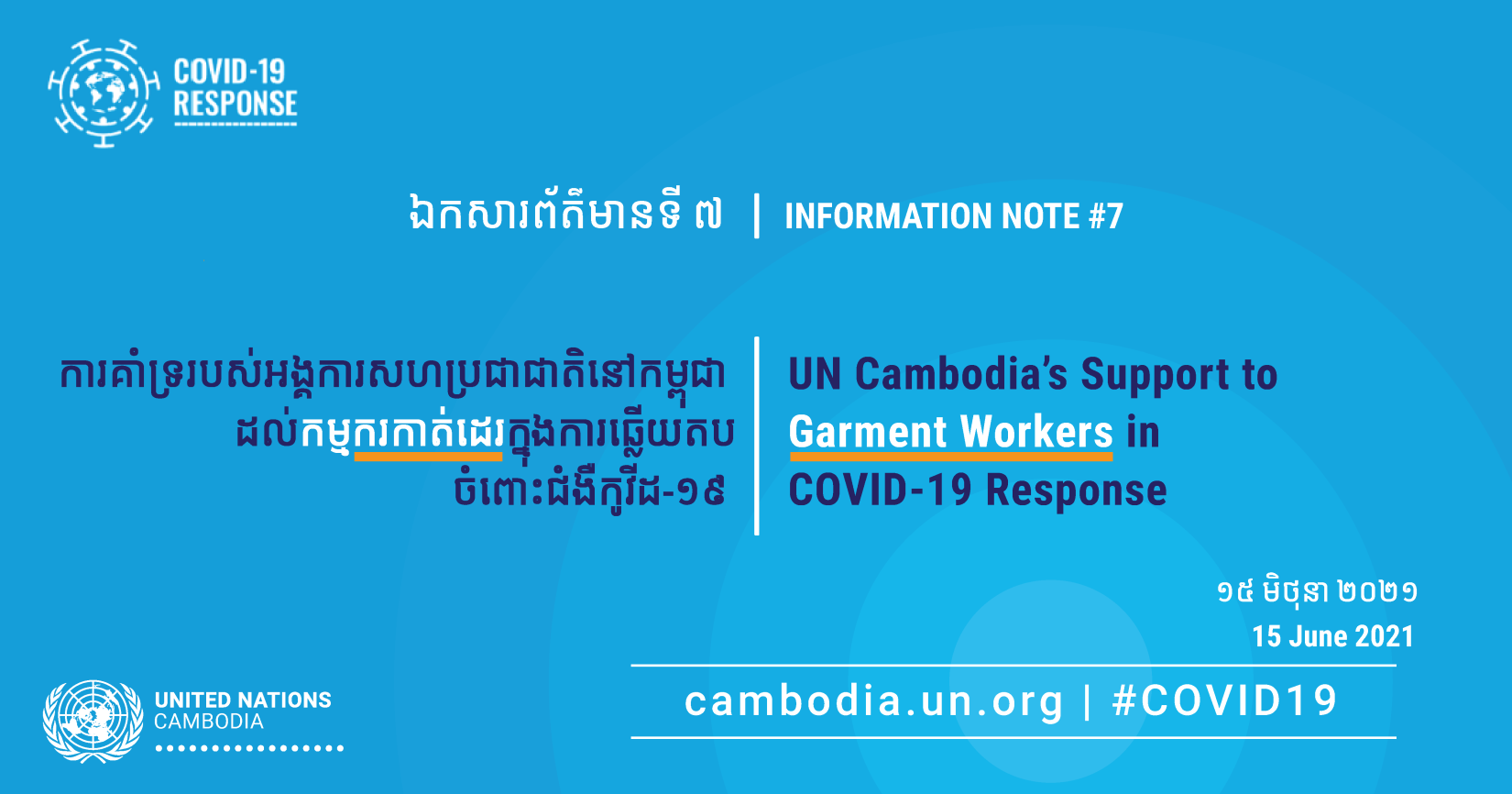Information Note #7: UN Cambodia’s Support to Garment Workers in COVID-19 Response
15 June 2021

COVID-19 pandemic significantly impacted the garment industry in Cambodia. The pandemic and efforts to slow the spread of the virus led to factory closures, layoffs and unpaid absence affecting the lives and livelihoods of approximately 900,000 garment sector workers. Women account for 80 percent of the garment sector workforce and are disproportionately impacted by the pandemic, exacerbating inequalities and deepening poverty. Crowded, close contact and confined settings (3C), are high-risk for COVID-19 virus transmission. Garment workers tend to live, work and commute in 3C settings, where social distancing is not possible, placing them at greater risks of exposure to the COVID-19 virus within and beyond their workplace.
The United Nations System in Cambodia welcomes the Royal Government of Cambodia’s efforts to prioritise COVID-19 vaccinations for the garment sector. Since April 2020, the Royal Government provided garment workers, who were suspended due to the pandemic, with a US$40 per month cash assistance. The Royal Government also recently approved a one-time post-lockdown emergency cash assistance paid in June 2021 that benefits garment workers. Notwithstanding on-going Government support, the United Nations System in Cambodia is concerned about the lasting impact of the pandemic and efforts to control it on the social and economic rights of garment workers. Job losses and reduced income have left many struggling to meet basic necessities and led to workers taking loans as a coping strategy. Many workers lack access to adequate social safety nets, such as unemployment benefits[1], which place them at risk of falling into poverty and even hunger. The toll extends to garment workers’ families and the informal economy around factories. In 2019, the garment industry contributed about 11 % to GDP. However, since the pandemic, garment exports dropped by around 9.9% contributing to a 3.4% reduction in GDP in 2020. The United Nations system is also concerned about conditions in quarantine facilities of garment workers when testing positive, including the lack of information, hygiene supplies and PPE.
In response, the United Nations System is working together with national authorities and stakeholders to mitigate the immediate negative impacts of the pandemic and to build a more sustainable and resilient garment industry for the long term. Through technical assistance and advocacy, the United Nations is prioritizing the protection of garment workers’ health, employment and income; as well as improving working conditions, promoting business continuity and boosting competitiveness of the garment sector. The United Nations supports bipartite committees (worker-management) in factories[2] as well as tripartite mechanisms involving government, employers and workers at national level to promote dialogue regarding the needs of the sector. The tripartite dialogue also encourages greater collaboration to find solutions during the pandemic. International brands sourcing from Cambodia[3] are important partners of the United Nations in the efforts to make a difference in the garment sector.
To better understand the situation of garment workers during COVID-19, the United Nations conducted interviews in May 2020 with nearly 400 garment workers, and again in May/June 2021 with 370 garment workers to understand their concerns and physical and mental well-being. The most common concern among workers were personal finances, including not being able to pay back loans, as well as the immediate safety and health of their families. Among workers, there are barriers to reporting symptoms, including fear of quarantine and loss of income. Further research showed that despite serious concerns related to COVID-19, it is a challenge for workers to adopt preventative behaviour measures. In light of this, the United Nations will launch a COVID-19 behavioural change campaign that will provide detail information about preventive and risk mitigation in the garment industry and surrounding communities.
To protect garment sector workers and safeguard the public health, the United Nations initiated a risk assessment in the garment sector to prepare factories for restarting operations after the lockdown in May 2021. This aimed to put risk mitigation measures in place before reopening through a multi-sectoral approach and greater community participation, including engaging the business sector for safer and more productive solutions for operating under a “new normal”. The United Nations is working jointly with the Ministry of Labour and Vocational Training on raising awareness of COVID-19 mitigation measures in factories in the Phnom Penh area and in surrounding provinces. The United Nations Guidelines on COVID-19 prevention measures in workplaces, factories and enterprises were shared with the Government. In addition, a United Nations-action checklist on Prevention and Mitigation of COVID-19 at work and a guideline on discrimination and stigma related to COVID-19 were translated and distributed to factories. Recommendations were also provided to the Government on handling positive COVID-19 cases in factories. The United Nations has also widely disseminated communications directly to garment factories and workers which encourage them to adopt precautions to reduce exposure to and transmission of COVID-19.
As part of a technical assistance programme focusing on the garment sector, the United Nations provided factory and sectoral level support, including mandatory assessments for factories, capacity development, virtual workshops and convening the industry stakeholders to discuss issues related to the garment sector in Cambodia. The United Nations system has been consistently engaging with factories and industry players on issues including occupational safety and health (OSH), gender equality, COVID-19 prevention, emergency preparedness, crisis management, communications with workers and leadership, labour law, digital wages, sustainable compliance and future of the industry in Cambodia. Since the start of 2021, the United Nations facilitated more than 455 meetings with factory level worker-management committees in approximately 200 factories (289 virtual visits and 166 in person visits). More than 40 virtual trainings on different topics for factory workers and management were conducted. The United Nations continues to work closely with the Ministry of Labour and Vocational Training, Garment Manufacturers’ Association in Cambodia (GMAC) and Unions on these critical issues.
The United Nations agency, ILO, is mandated to conduct assessments on working conditions on core international labour standards, and the national labour law in all garment-exporting factories in line with agreements under the Memorandum of Understanding with the Royal Government of Cambodia and Garment Manufacturers’ Association in Cambodia. One hundred and ninety (190) virtual assessments have been carried out this year.
In addition, the United Nations is working with the Ministry of Education Youth and Sport (MoEYS), private sector, garment factories and GMAC to provide tailored upskilling courses for women garment workers, using education as a tool to enhance their resilience to economic shocks. The courses aim not only to increase basic literacy and numeracy skills of garment workers, but enhance financial literacy and learning on reproductive health, nutrition, worker rights and labour laws. The Factory Literacy Programme (FLP) has continued through the COVID-19 pandemic and has served over 2000 workers across 12 provinces through 25 partner factories. The programme will expand and continue for another 3 years.
The COVID-19 pandemic presents an opportunity to improve conditions in the garment sector and to foster a rights-based, sustainable and gender-responsive recovery. The United Nations encourages the authorities to protect the basic rights of garment workers in line with their obligations under international human rights and labour rights norms and standards. Minimising the negative impacts of COVID-19 on the livelihoods of garment workers and strengthening access to social protection mechanisms should be the priority. Appropriate measures should focus on ensuring the health and safety of garment workers both inside and outside the workplace. Gender responsive measures and policies that more effectively meet the differing needs of women, men and others in the sector are also required. The United Nations System in Cambodia remains committed to working with the Government, employers and workers to ensure that the garment industry can become increasingly sustainable and resilient to shocks.
###
UN Cambodia’s Response to COVID-19 Information Notes are official documents from the United Nations in Cambodia intended for the media and other partners. They are prepared by the Office of the UN Resident Coordinator.
[1] Currently, there is no unemployment scheme in Cambodia and workers do not receive any social protection benefits when they lose their jobs. However, measures have been put in place to address loss of income due to factory closures related to COVID-19, but these are often inadequate. Many garment sector workers are excluded from accessing some benefits as they are formally employed and not viewed as poor.
[2] International Labour Organization (ILO)-International Finance Corporation (IFC)’s Better Work programme works at enterprise level in ten countries supporting factories to improve working conditions through dialogue between management and worker representatives (bipartite committee). In Cambodia Better Factories Cambodia works with around 200 bipartite committees promoting social dialogue.
[3] Better Factories Cambodia, under the global Better Work programme, has partnership agreements with around 40 international brands.








